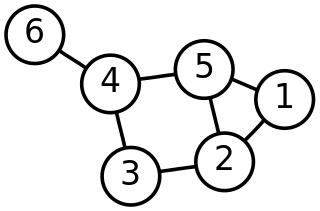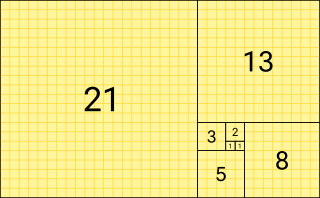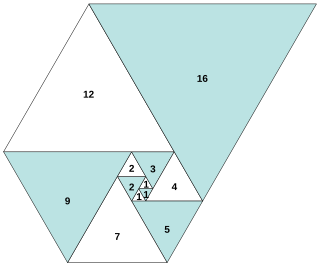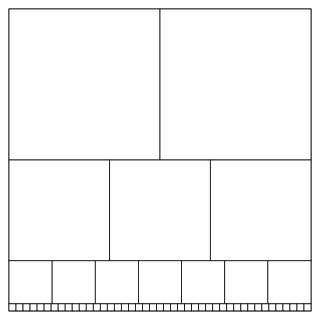Related Research Articles

Discrete mathematics is the study of mathematical structures that can be considered "discrete" rather than "continuous". Objects studied in discrete mathematics include integers, graphs, and statements in logic. By contrast, discrete mathematics excludes topics in "continuous mathematics" such as real numbers, calculus or Euclidean geometry. Discrete objects can often be enumerated by integers; more formally, discrete mathematics has been characterized as the branch of mathematics dealing with countable sets. However, there is no exact definition of the term "discrete mathematics".

In mathematics, the Fibonacci sequence is a sequence in which each number is the sum of the two preceding ones. Numbers that are part of the Fibonacci sequence are known as Fibonacci numbers, commonly denoted Fn . Many writers begin the sequence with 0 and 1, although some authors start it from 1 and 1 and some from 1 and 2. Starting from 0 and 1, the sequence begins

In mathematics, a sequence is an enumerated collection of objects in which repetitions are allowed and order matters. Like a set, it contains members. The number of elements is called the length of the sequence. Unlike a set, the same elements can appear multiple times at different positions in a sequence, and unlike a set, the order does matter. Formally, a sequence can be defined as a function from natural numbers to the elements at each position. The notion of a sequence can be generalized to an indexed family, defined as a function from an arbitrary index set.
In mathematics, a recurrence relation is an equation according to which the th term of a sequence of numbers is equal to some combination of the previous terms. Often, only previous terms of the sequence appear in the equation, for a parameter that is independent of ; this number is called the order of the relation. If the values of the first numbers in the sequence have been given, the rest of the sequence can be calculated by repeatedly applying the equation.
In mathematics, a Cullen number is a member of the integer sequence . Cullen numbers were first studied by James Cullen in 1905. The numbers are special cases of Proth numbers.
The On-Line Encyclopedia of Integer Sequences (OEIS) is an online database of integer sequences. It was created and maintained by Neil Sloane while researching at AT&T Labs. He transferred the intellectual property and hosting of the OEIS to the OEIS Foundation in 2009, and is its chairman.
David Stifler Johnson was an American computer scientist specializing in algorithms and optimization. He was the head of the Algorithms and Optimization Department of AT&T Labs Research from 1988 to 2013, and was a visiting professor at Columbia University from 2014 to 2016. He was awarded the 2010 Knuth Prize.

John Frank Adams was a British mathematician, one of the major contributors to homotopy theory.

In number theory, the Padovan sequence is the sequence of integers P(n) defined by the initial values
In mathematical analysis and number theory, Somos' quadratic recurrence constant or simply Somos' constant is a constant defined as an expression of infinitely many nested square roots. It arises when studying the asymptotic behaviour of a certain sequence and also in connection to the binary representations of real numbers between zero and one. The constant named after Michael Somos. It is defined by:

In number theory, Sylvester's sequence is an integer sequence in which each term is the product of the previous terms, plus one. Its first few terms are

Ken Ono is an American mathematician with fields of study in number theory. He is the STEM Advisor to the Provost and the Marvin Rosenblum Professor of Mathematics at the University of Virginia.

A geometric progression, also known as a geometric sequence, is a mathematical sequence of non-zero numbers where each term after the first is found by multiplying the previous one by a fixed number called the common ratio. For example, the sequence 2, 6, 18, 54, ... is a geometric progression with a common ratio of 3. Similarly 10, 5, 2.5, 1.25, ... is a geometric sequence with a common ratio of 1/2.
In mathematics, a Somos sequence is a sequence of numbers defined by a certain recurrence relation, described below. They were discovered by mathematician Michael Somos. From the form of their defining recurrence, one would expect the terms of the sequence to be fractions, but nevertheless many Somos sequences have the property that all of their members are integers.

Henry Wadsworth Gould is a Professor Emeritus of Mathematics at West Virginia University.
Francis Edward Su is an American mathematician. He joined the Harvey Mudd College faculty in 1996, and is currently Benediktsson-Karwa Professor of Mathematics. Su served as president of the Mathematical Association of America from 2015–2017 and is serving as a Vice President of the American Mathematical Society from 2020-2023. Su has received multiple awards from the MAA, including the Henry L. Alder Award and a Deborah and Franklin Haimo Award for Distinguished College or University Teaching of Mathematics, both for distinguished teaching. He was also a Phi Beta Kappa Visiting Scholar during the 2019-2020 term. He was elected as a Fellow of the American Mathematical Society, in the 2025 class of fellows.
Somos may refer to:

In mathematics, an infinite sequence of numbers is called constant-recursive if it satisfies an equation of the form
In mathematics, a Göbel sequence is a sequence of rational numbers defined by the recurrence relation
In mathematics and computer science, the sorting numbers are a sequence of numbers introduced in 1950 by Hugo Steinhaus for the analysis of comparison sort algorithms. These numbers give the worst-case number of comparisons used by both binary insertion sort and merge sort. However, there are other algorithms that use fewer comparisons.
References
- Michael Somos and Robert Haas, "A Linked Pair of Sequences Implies the Primes Are Infinite", The American Mathematical Monthly , volume 110, number 6 (June – July, 2003), pp. 539–540